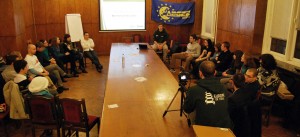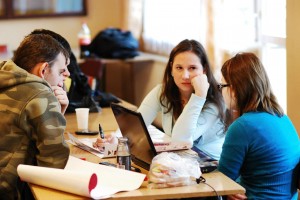Europe on Track. For 27 days I have been travelling on the tracks of Europe with this amazing project, going from Brussels to Istanbul. Interviewing young people along the way, on their ideas about the future of the European Union, politics, and youth participation, but also sustainability, non-formal education, and entrepreneurship. The perfect opportunity as Policy Officer on Sustainability to get an idea of what people around the continent think on the topics of sustainability. 27 days, 14 countries, and 19 cities, but what have I learned?
First, there is good news when it comes to the general awareness of sustainability. Most young people have some notions of sustainability and its main challenges, quoting our societies’ oil dependency, increasing use of resources, and enormous production of waste, as their principal points of concern. Too often, however, it stops there, as they do not know what to do about these problems, beyond using public transportation, sorting their trash, and paying attention to the amounts of energy and water they use.
The main barrier to taking further action seems to be a lack of readily accessible, easily understandable, but—with an eye to the growing awareness on the practice of greenwashing—also reliable information on how to live more sustainably. Other obstacles mentioned, include the extra time it takes to pursue more sustainable ways of living and, obviously, the extra cost it still involves—both resources which most students lack.
“It doesn’t make sense that I would have to pay more for sustainable products and services if I don’t see that it changes anything”. — Lise (25)
Young people have solutions as well though. One of the most-cited concerns of students is that mainstream formal education pays barely any attention to the topics of sustainability, giving them no tools for a more sustainable lifestyle. This is where non-formal education comes in, teaching young people almost everything they know about sustainability, but across Europe people have been pleading for an increased inclusion of Education for sustainability in curricula from primary school to tertiary education. In Zagreb, for example, we spoke with people at the Croatian Youth Council who took matters into their own hands, and were cooperating with the Ministry of Education to provide this kind of civic education to schools around the country.

A second suggestion is for greater support for—but also control of—companies which show and promote sustainable behaviour. Young people clearly recognise the important role the market has to play in the realisation of more sustainable lifestyles, and want companies that make efforts towards this to receive better support in the form of subsidies, so the price for more sustainable products can be lowered in comparison with standard products and services.
“Educate, educate, educate. We need to change people’s minds from the start. You can make grown-ups recycle, but they will still buy too much stuff in plastic bags”. — Daniel (21)
Being young is not an excuse for stupidity, however, and they are aware of the use of greenwashing—meaning the deceptive use of green marketing to promote the perception that a company’s aims are environmentally friendly. For this, people also want better control of such companies, and a periodic report by them on the real efforts they undertake and their impact on the environment and society.
 And now? Collecting real-life information has only been the first step of course. Already, I have written some first posts on the discussions we had with young people in Berlin and Prague, and more will follow. As Policy Officer, I will soon publish an online survey to collect opinions on the topics of Education for sustainability and Sustainable entrepreneurship—but already now you can answer the questions on sustainability we have asked people during Europe on Track. All of this will then be collected in a position paper and presented to various stakeholders for further action. Finally, in connection with our focus on entrepreneurship, we have seen an interest of young people in the development of small start-ups which could trigger a turnaround in society, as they believe existing, well-established companies are too slow to start this necessary shift to sustainability. As such, sustainable or social entrepreneurship—meaning opening a business with the goal to change society for the better—is actually viewed more positively than ‘regular’ entrepreneurship, as it is also giving back to society. But here again, it is argued that the topic needs to receive more attention at schools and universities, and young entrepreneurs will require more and better support, both financially and by setting up advice structures.
And now? Collecting real-life information has only been the first step of course. Already, I have written some first posts on the discussions we had with young people in Berlin and Prague, and more will follow. As Policy Officer, I will soon publish an online survey to collect opinions on the topics of Education for sustainability and Sustainable entrepreneurship—but already now you can answer the questions on sustainability we have asked people during Europe on Track. All of this will then be collected in a position paper and presented to various stakeholders for further action. Finally, in connection with our focus on entrepreneurship, we have seen an interest of young people in the development of small start-ups which could trigger a turnaround in society, as they believe existing, well-established companies are too slow to start this necessary shift to sustainability. As such, sustainable or social entrepreneurship—meaning opening a business with the goal to change society for the better—is actually viewed more positively than ‘regular’ entrepreneurship, as it is also giving back to society. But here again, it is argued that the topic needs to receive more attention at schools and universities, and young entrepreneurs will require more and better support, both financially and by setting up advice structures.
Do you want to know more on the process, share your ideas, or get involved? Then contact me at mathieu.soete@aegee.org.
Written by Mathieu Soete, Policy Officer on Sustainability of AEGEE-Europe


